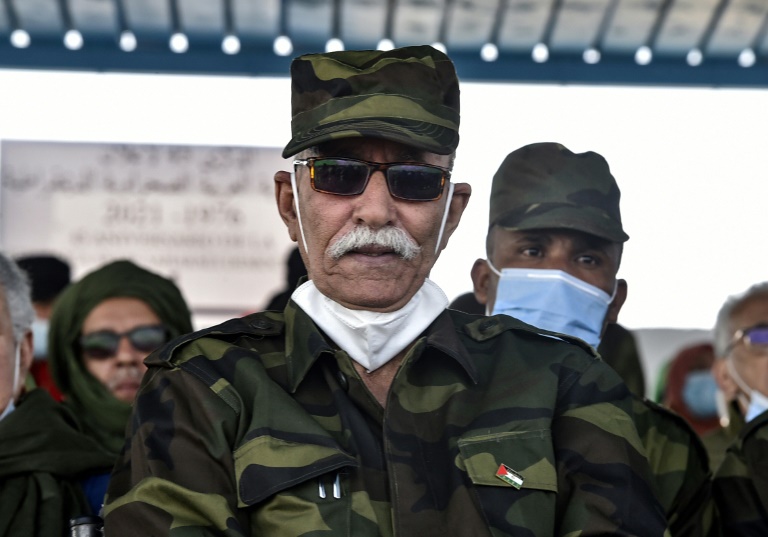The leader of Western Sahara’s independence movement, whose presence in Spain has angered Morocco, on Tuesday denied allegations of torture and genocide while being questioned by a Spanish judge.
Brahim Ghali, who heads the Algeria-backed Polisario Front, testified by video conference from a hospital in northern Spain where he is recovering from a severe case of Covid-19.
The accusations against Ghali “are totally false” and are “politically motivated to target the credibility of the Sahrawi people,” his lawyer Manuel Olle told reporters after the closed-door hearing of Spain’s National Court.
Asked if Morocco was behind the lawsuits against Ghali, he said: “If I think about it, I would probably say what you just said.”
Ghali, who is also the president of the Sahrawi Democratic Arab Republic, a self-declared state since 1976, is facing two investigations in Spain.
Once his inquiries are completed, the presiding judge will have to decide whether to charge the Polisario leader or dismiss the lawsuits against him.
During the hearing, the judge refused to impose any precautionary measures — such as seizing Ghali’s passport — arguing there was no flight risk.
Ghali was severely ill when he arrived at a hospital in the northern Spanish town of Logrono in mid-April, with his presence in Spain triggering a major diplomatic spat between Rabat and Madrid.
Last month, Spain was caught off guard when as many as 10,000 people surged into its tiny North African enclave of Ceuta as Moroccan border guards looked the other way, in what was widely seen as a punitive political gesture.
The Polisario Front has long fought for the independence of Western Sahara, a desert region bigger than Britain which was a Spanish colony until 1975.
Morocco controls 80 percent of the territory, while the rest — an area bordering Mauritania that is almost totally landlocked — is run by the Polisario Front.
– ‘War criminal’ –
One of the investigations relates to allegations of torture at Sahrawi refugee camps in Tindouf, a town in western Algeria.
The accusations were made in 2020 by Sahrawi activist Fadel Breika, who also holds Spanish nationality.
While a Spanish court initially rejected the complaint, earlier this year it agreed to reopen the case.
The second investigation relates to allegations of genocide, murder, terrorism, torture and disappearances made in 2007 by the Sahrawi Association for the Defence of Human Rights (ASADEDH), which is based in Spain.
Rabat has already warned the Spanish government that allowing Ghali to “go home, bypass Spanish justice and ignore the victims” would further worsen ties.
In 2016, Ghali was summoned for questioning in relation to the second complaint when he was due to attend a conference in Spain in support of the Sahrawi people. He eventually cancelled his trip.
Rabat considers Ghali to be a “war criminal”, and Morocco’s foreign ministry said Monday that his presence in Spain was a “test” for bilateral ties, warning the crisis would “not be resolved with a single court hearing”.
And it reiterated demands for a “transparent investigation” into Ghali’s arrival in Spain on what it said was a forged passport.
– ‘Attack the borders’ –
In response, Spain’s Prime Minister Pedro Sanchez said it was “unacceptable” for Morocco to “attack Spain’s borders” by letting migrants into Ceuta due to “differences in foreign policy”.
Citing diplomatic sources, Spain’s El Pais newspaper said Ghali was “critically ill” when he arrived on a medicalised Algerian government plane on April 18, bearing a diplomatic passport.
It said he was admitted to the hospital under a false name for “security reasons”.
The UN refers to Western Sahara as a “non-self-governing territory”. Morocco is willing to offer it autonomy within Morocco but not independence.
After 16 years of war, Rabat and the Polisario signed a ceasefire in 1991, but a UN-backed referendum on self-determination has been repeatedly postponed.
Hostilities resumed last November when the Polisario declared the ceasefire to be over after Morocco sent troops into a UN-patrolled buffer zone to reopen a key road.










